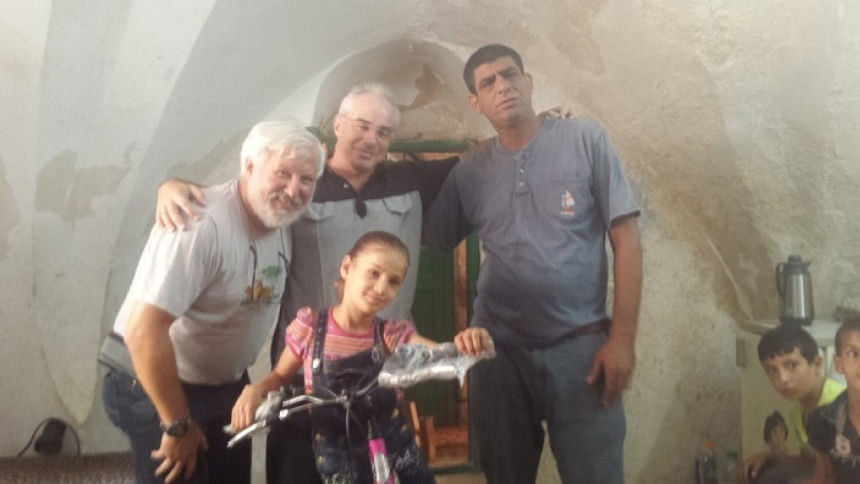Israel, a bike and our moral choice

Moral choices can sometimes seem simple, and at other times just the opposite. But it does not always have to be that complicated. There are heart-warming stories to appreciate the ways we can keep our choices simple, sensible and humane.
Take the recently published story in the Times of Israel, "Israeli buys Palestinian girl a new bike after border guards broke hers." We learn about an eight-year old Palestinian girl Anwar Burqan. "On August 2, two border guards were caught on film taking 8-year-old Anwar Burqan's bicycle and putting it into nearby bushes. During the incident, the bicycle was badly damaged and could no longer be used, according to the family." Well, for Palestinians, the 'sub-humans', in the ongoing drama, that only the bike was damaged/broken and nothing worse, is something to be grateful about.
However, one Israeli, Sami Jolles, enters the picture here. He is an Israeli diamond merchant. As he came across the story, he empathised with the girl based on recollection of what "happened to his father in Europe during the 1920s, when a group of anti-Semites attacked him and threw his bicycle into a river." The Israeli "guards told investigators that they confiscated Burqan's bicycle to prevent her from crossing into the Jewish neighbourhood of Hebron, which Palestinians are banned from entering."
He was so moved that he arranged a bike for that girl and had it delivered to her through three of his peace-activist friends/contacts. Jolles learnt from them that "She's a shy little girl, but she was so appreciative; her eyes were shining."
The bike given to Burqan is the least of the story here. Jolles' initiative to bring a smile to an eight-year Palestinian girl is indeed heart-warming. How long have the eyes of Palestinians not shined! What motivated and guided Jolles to think about Burqan and her bike shows an important, fundamental choice.
When bad things are done to us, we have a choice. We can wish that the same thing does not happen to anyone else, or do the same to someone else. The morality is simple and the most conscientious people, whose moral radars are working, would not have difficulty identifying and making the right choice. Unfortunately, the case of Israel has been the latter; what happened to them in the Holocaust (persecution based on racism and bigotry), they are doing to others. Worse still, the Holocaust, a monstrosity that shames humanity, came to an end after a few years. But the moral tragedy of persecuting Palestinians has continued for more than half a century, and is happening in the hands of those who were the victims, or are children of the victims of the same monstrosity.
It does not have to be that way, and that's the story of Sami Jolles, an Israeli. God bless him. Burqan will share the bicycle, like before, with nine of her siblings. Seeing the joy the bike has brought to Burqan, Jolles shared: "I think that my father would be proud of me." What about the fathers or grandfathers of those who broke/damaged the bike?
Sometimes imagination gets the best of us and we can get carried away. But just imagine if we suddenly started embracing the principle, wisdom and value of Sami Jolles; that not only will we not do such wrongs to others as was done to us or our dear ones, but we will try also to make the world a little better. We will be the reason for a few more eyes to shine, a few more faces to smile, even if it is due to a bike.
Choices are simple, but the possibilities are endless.
The author is an economist and educator in the Gulf.
Email: [email protected].

 For all latest news, follow The Daily Star's Google News channel.
For all latest news, follow The Daily Star's Google News channel. 



Comments